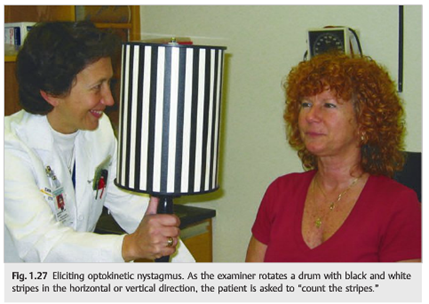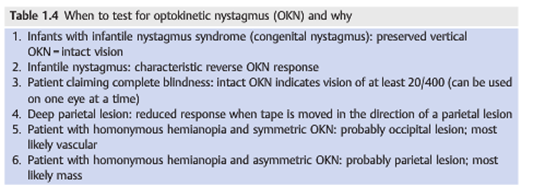Question: In which of the following conditions is optokinetic stimulus testing useful?
1. Infantile nystagmus
2. Patients claiming complete blindness
3. Homonymous hemianopia
4. Internuclear ophthalmoplegia
5. Dorsal midbrain syndrome
6. Optic neuritis
 1
1
Correct Answers:
1. Infantile nystagmus
2. Patients claiming complete blindness
3. Homonymous hemianopia
4. Internuclear ophthalmoplegia
5. Dorsal midbrain syndrome
Explanation: “An optokinetic stimulus produces a jerk nystagmus in patients with good vision and intact ocular motor systems. It coordinates eye movements when the environment moves, such as when looking out from a moving train. Physiologic optokinetic nystagmus (OKN) can be elicited by rotating a striped drum or moving a striped tape horizontally and vertically and asking the patient to “count the stripes as they go by” (▶Fig. 1.27).The slow phases of the OKN are generated as the patient follows a target. The OKN fast phase is a corrective saccade to view the next target. The OKN response is involuntary and is difficult to suppress. An intact OKN response confirms that visual acuity is at least 20/400. This is very helpful in checking the vision of infants and very young children as well as patients suspected of nonorganic visual loss claiming to have a visual acuity of hand motion, light perception, or no light perception. Testing the OKN is also helpful to elicit subtle adduction weakness in internuclear ophthalmoplegia and convergence retraction nystagmus of the dorsal midbrain syndrome (rotate the drum downward). ▶Table 1.4 outlines when to test for OKN and why.”1

More than 600 additional neuro-ophthalmology questions are freely available at http://EyeQuiz.com.
Questions prior to September 2016 are archived at http://ophthalmology.stanford.edu/blog/
After that, questions are archived at https://neuro-ophthalmology.stanford.edu
Follow https://twitter.com/NeuroOphthQandA to be notified of new neuro-ophthalmology questions of the week.
Please send feedback to tcooper@stanford.edu